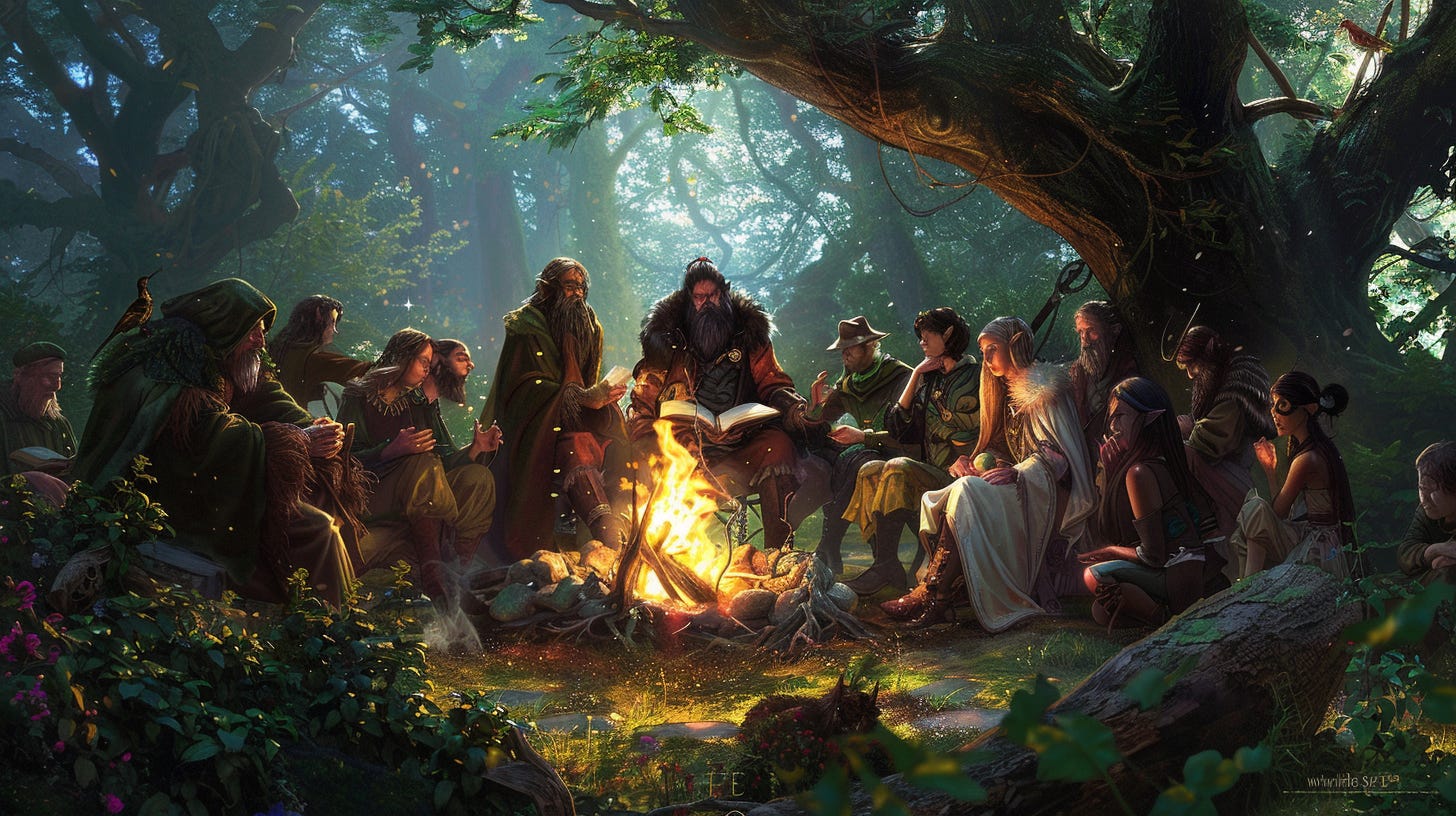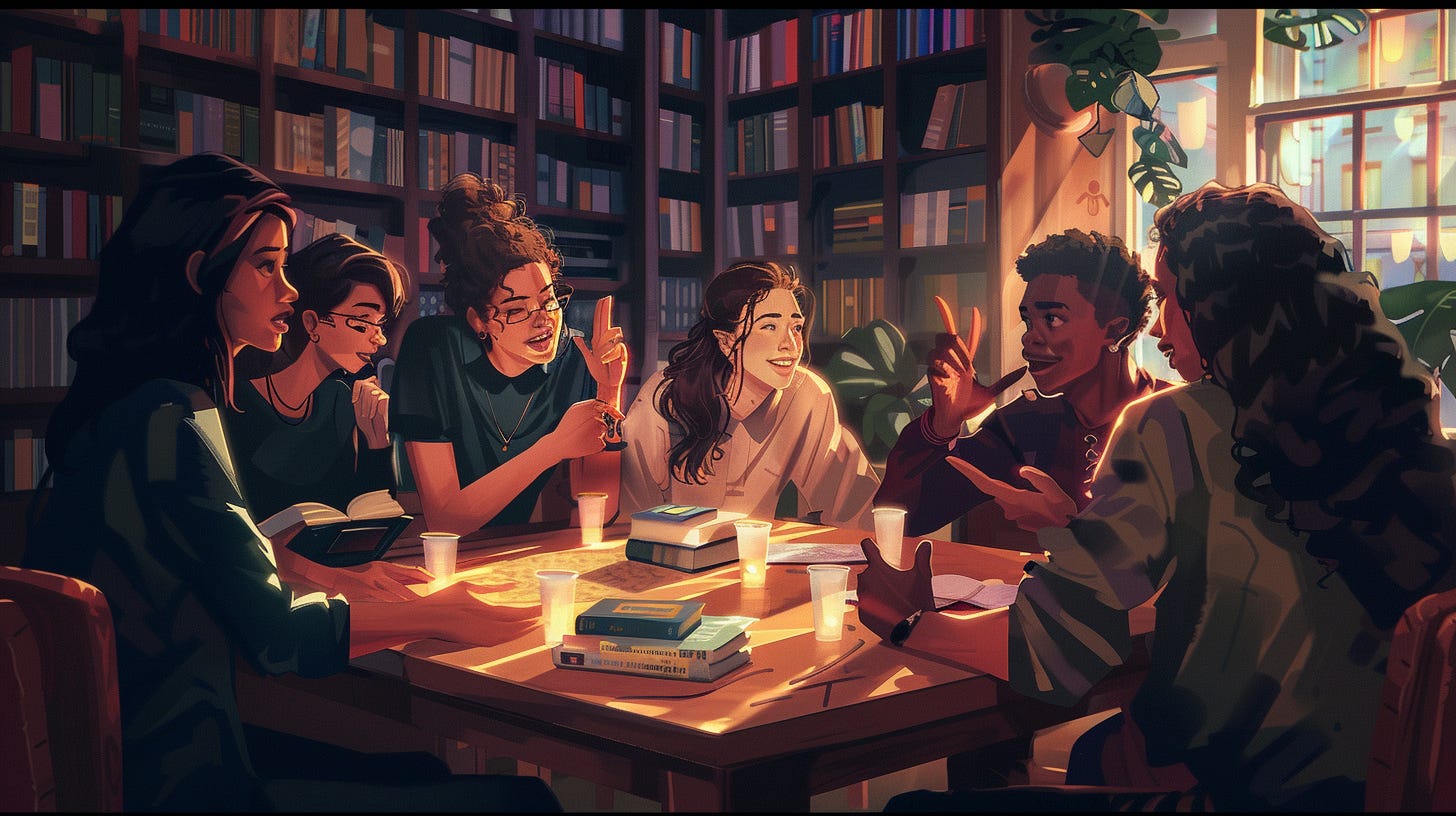Walking in Magical Footsteps
Fantasy's Hidden Role in Cultivating Compassion
In a world increasingly divided by ideology and identity, where do we turn to cultivate the empathy necessary for our shared humanity? The answer may lie in an unexpected place: between the covers of fantasy novels, where dragons soar and impossible magic bends reality.
"Fantasy is hardly an escape from reality. It's a way of understanding it." — Lloyd Alexander
As a lifelong reader and writer of fantasy—particularly stories set against maritime backdrops—I've come to believe that the genre offers something uniquely valuable: a training ground for compassion that transcends the limitations of our everyday experience.
THE ALCHEMY OF PERSPECTIVE
Fantasy performs a remarkable feat of cognitive alchemy. It asks us to step not just into another person's shoes, but into entirely different skins—to see through the eyes of elves and dwarves, sirens and selkies, outcasts and emperors. This perspective-shifting is more than mere entertainment; it's a form of psychological exercise that strengthens our empathic muscles.
When we follow a protagonist whose experience differs dramatically from our own—whether through magical ability, cultural background, or even species—we practice the mental gymnastics necessary for true compassion: the ability to understand and share the feelings of another.
Consider Frodo's burden in The Lord of the Rings. As readers, we feel the physical and psychological weight of the Ring, its corruption spreading like poison through his mind. We experience, viscerally, what it means to bear a terrible responsibility. Later, when we encounter someone in our own lives struggling beneath invisible burdens, that muscle memory of empathy activates.
The translation isn't literal—we've (probably) never carried a cursed artifact to Mordor—but the emotional architecture is the same. Fantasy has trained us to recognize suffering, even when it wears unfamiliar faces.
SAFE DISTANCE, REAL EMOTIONS
One of fantasy's greatest strengths is its ability to create emotional distance while paradoxically deepening emotional engagement. By framing difficult issues within invented worlds, fantasy provides a buffer that allows readers to process complex feelings without the immediate defensive reactions that real-world scenarios might trigger.
This mechanism is particularly powerful when addressing trauma, prejudice, and moral complexity. Take N.K. Jemisin's Broken Earth trilogy, which explores systemic oppression through the lens of people who can control seismic activity. The narrative allows readers to experience viscerally the injustice of discrimination while temporarily bypassing their own cultural biases.
As psychiatrist Janina Fisher notes, "We can only develop compassion for others when we can see clearly without being overwhelmed by our own pain." Fantasy provides exactly this balance—emotional reality without emotional flooding.
THE EMPATHY OF IMPOSSIBLE CHOICES
Fantasy excels at presenting moral dilemmas that have no easy answers. When characters face impossible choices—preserve magic at the cost of peace, or sacrifice personal happiness for the greater good—readers must grapple alongside them with fundamental questions of ethics and values.
In Ursula K. Le Guin's The Ones Who Walk Away from Omelas, we confront the moral calculus of utilitarianism through a thought experiment so discomforting it sears into memory. Can the happiness of many justify the suffering of one? The fantasy framing allows us to consider this question without the political baggage it might carry in contemporary discourse.
This moral complexity trains us to recognize that real people, too, face impossible choices shaped by circumstances we may not fully understand. Fantasy teaches us to hesitate before judging others' decisions, knowing that we rarely see the full shape of another's constraints.
MONSTERS AND HUMANITY
Perhaps most powerfully, fantasy explores the nature of monstrosity and humanity in ways that translate directly to our capacity for compassion in the real world. By presenting characters who appear monstrous but possess deep humanity (like Gollum in The Lord of the Rings), alongside those who appear human but commit monstrous acts, fantasy disrupts our tendency to categorize others based on superficial traits.
In my own maritime fantasy world, I explore how sirens—creatures traditionally portrayed as murderous temptresses—might develop complex cultures and ethical systems of their own. When readers engage with these perspectives, they practice seeing beyond surface differences to recognize shared values and vulnerabilities.
This practice transfers to real-world interactions, where we're often quick to demonize those who seem different from ourselves. Fantasy reminds us that the line between monster and human is rarely determined by appearance, but by choices and circumstances.
FANTASY AS MORAL IMAGINATION
Martha Nussbaum, philosopher and author of Poetic Justice, argues that literature develops our "moral imagination"—our capacity to envision the full humanity of people whose experiences differ from our own. Fantasy, with its vast imaginative scope, may be uniquely positioned to expand this faculty.
Consider how fantasy often features characters who begin as strangers to each other, suspicious and wary due to ancient conflicts or cultural differences. As these characters journey together, they discover points of connection despite their differences. Readers experience this transformation from wariness to understanding, from suspicion to trust.
This narrative arc mirrors the real-world process of overcoming prejudice through meaningful contact with those different from ourselves. Fantasy provides a template for this transformation, enacting it again and again in our minds until it becomes a familiar pattern we can recognize and reproduce in our own lives.
THE LIMITATIONS OF LIVED EXPERIENCE
In our increasingly polarized world, calls for empathy often bump against the limitations of personal experience. "You can't truly understand unless you've lived it," we're told—a perspective that, while acknowledging the uniqueness of individual experience, can also create barriers to compassion across difference.
Fantasy offers a bridge across this gap. While it doesn't replace the importance of listening to others' lived experiences, it expands our capacity to imagine realities beyond our own. A reader who has never faced discrimination may still gain emotional insight from experiencing it through a fantasy character's eyes.
This is not to claim that reading fantasy makes us fully understand oppression or trauma we haven't experienced. Rather, it means that fantasy provides emotional vocabulary and context that can make us more receptive when others share their real experiences.
"Fantasy is a necessary ingredient in living. It's a way of looking at life through the wrong end of a telescope." — Dr. Seuss
BEYOND ESCAPISM: FANTASY AS ENGAGEMENT
Critics often dismiss fantasy as mere escapism—a retreat from reality rather than an engagement with it. This perspective misunderstands the psychological function of fantasy literature. Far from being an escape, fantasy is a form of deep engagement with reality, one that removes certain barriers to understanding.
By temporarily freeing us from the constraints of what is possible, fantasy allows us to focus on what is essential: the emotional truth of experience, the complexity of moral choice, the dignity inherent in all conscious beings. These insights don't evaporate when we close the book; they become part of our emotional architecture.
This is why fantasy readers often demonstrate heightened empathy in psychological studies. Research by Gabriel and Young (2011) found that readers experienced "narrative collective assimilation"—actually feeling like they belonged to the fantasy groups depicted in stories, which correlates with increased empathy toward different types of people in real life. Similarly, Oatley (2016) demonstrated that immersion in fictional worlds, particularly those requiring significant imagination, enhances readers' ability to understand different perspectives and social situations.
CULTIVATING COMPASSION THROUGH FANTASY
How can we intentionally develop compassion through our engagement with fantasy? Several approaches might enhance this natural connection:
Seek diverse perspectives: Read fantasy by authors from different cultural backgrounds, who bring varied worldviews to their world-building.
Engage with moral complexity: Look for fantasy that resists simple good/evil dichotomies in favor of nuanced ethical questions.
Reflect on emotional responses: When a fantasy story moves you, consider why. What aspect of the character's experience resonated with your own? How might this translate to understanding others?
Connect fiction to reality: After reading, consider how the emotional insights from fantasy might apply to real-world situations and relationships.
Join discussions: Engage with other readers about the moral and emotional dimensions of fantasy stories, allowing multiple perspectives to enrich your understanding.
THE COMPASS OF COMPASSION
In a world where technology connects us globally yet often divides us tribally, fantasy literature offers a compass for navigating difference with compassion. By training us to see beyond surface characteristics to the shared humanity beneath, fantasy prepares us for encounters with the "other" in our own lives.
This is not to suggest that fantasy alone can heal societal divisions or replace the hard work of justice and reconciliation. But it can provide a crucial foundation: the ability to imagine experiences beyond our own, to recognize the humanity in those who seem most different from us, and to approach difference with curiosity rather than fear.
As we journey through invented worlds, we develop the emotional intelligence necessary for our real one. We learn that the true magic isn't found in spells or enchantments, but in the remarkable human capacity to understand and care for one another—even across the greatest of divides.
A Question That Connects
What fantasy character or story has most expanded your capacity for understanding people different from yourself? How did it change your perspective?
I invite you to share your experiences in the comments. Our stories about stories may be the most powerful magic of all.
Next in this series: "Monsters as Metaphor: The Psychology Behind Fantasy Creatures" – exploring how fantasy monsters embody cultural fears and fascinations.
About the Author: Morgan A. Drake crafts dark maritime fantasy that explores the boundaries between historical seafaring traditions and the supernatural. Drawing on years of research into maritime mysteries and folklore, Morgan creates worlds where the line between natural and otherworldly perils blurs with the horizon.
References and Further Reading
Bal, P. M., & Veltkamp, M. (2013). How does fiction reading influence empathy? An experimental investigation on the role of emotional transportation. PLoS ONE, 8(1).
Johnson, D. R. (2012). Transportation into a story increases empathy, prosocial behavior, and perceptual bias toward fearful expressions. Personality and Individual Differences, 52(2), 150-155.
Kidd, D. C., & Castano, E. (2013). Reading literary fiction improves theory of mind. Science, 342(6156), 377-380.
Mar, R. A., & Oatley, K. (2008). The function of fiction is the abstraction and simulation of social experience. Perspectives on Psychological Science, 3(3), 173-192.
Nussbaum, M. C. (1997). Poetic Justice: The Literary Imagination and Public Life. Beacon Press.
Gabriel, S., & Young, A. F. (2011). Becoming a vampire without being bitten: The narrative collective-assimilation hypothesis. Psychological Science, 22(8), 990-994.
Johnson, D. R., Jasper, D. M., Griffin, S., & Huffman, B. L. (2013). Reading narrative fiction reduces Arab-Muslim prejudice and offers a safe haven from intergroup anxiety. Social Cognition, 31(5), 578-598.
Mar, R. A., Oatley, K., & Peterson, J. B. (2009). Exploring the link between reading fiction and empathy: Ruling out individual differences and examining outcomes. Communications, 34(4), 407-428.
Oatley, K. (2016). Fiction: Simulation of social worlds. Trends in Cognitive Sciences, 20(8), 618-628.
Tolkien, J. R. R. (1954). The Fellowship of the Ring. George Allen & Unwin.
Image Note: Unless otherwise credited, the illustrations in this post are creative interpretations developed by the author with AI assistance, designed to evoke the atmosphere of maritime legend rather than serve as historical documentation. For historical visual references, please consult the sources listed in the references section.








Yes! I love how fantasy gives you the chance to deal with real-world emotions and problems in a way that doesn't feel pressured by all the rules of reality. Great article!
I absolutely love this bit about the sirens! You're speaking my language right now! ❤️